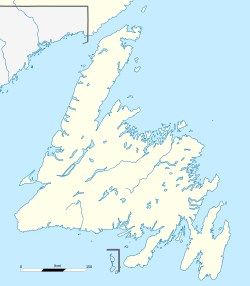Fishing has long remained the main industry in Grey River with the salmon fishery becoming an economic backbone for the community. Since the 1960s and 1970s, residents have increasingly returned to the salmon fishery for income. The scallop fishery also proposes a viable fishing alternative. [9]
Sawmill, mine, and bunkhouse
The sawmill in Little River was built in 1955 by then owner, Tom Young, and is currently owned by Garfield Young. Lumber made at this sawmill was sold to several places outside Little River. It was turned into a gas pump in 1988 once the sawmill had fallen out of use and a place to store gasoline and fuel was needed. Prior to this, fuel was stored outside in large drums.
Grey River Tungsten of Buchans, NL (now Playfair Mining, Vancouver, BC, Canada) started the mine upon discovering plentiful tungsten. They dumped the leftover dirt about a hundred meters from the mine entrance by using a little cart run by a diesel motor. The mine went in the cliff about a mile and a half. The mine shut down because the price of Tungsten dropped on the world market. Today, the stock price lists at a penny or two per share. The property is located adjacent to the fishing village of Grey River.
The miners built the bunkhouse in 1962. Some miners stayed there while others stayed in their homes. An American company named Asarco (American Smelting And Refining Company) owned the mine and the bunkhouse, but now Liberty Resources does. Inside the bunkhouse, there was just a straight hallway with sleeping quarters on each side. Today, teachers stay in the bunkhouse.
A 6,300 foot long (1,920 metre) adit has been driven into the Main Vein from near the village of Grey River at approximately 40 metres above sea level. Docking and wharf facilities existed at the Asarco adit but the present conditions are not known.
A large government-owned wharf in Grey River is serviced by coastal boat from Burgeo, a coastal port about 40 km to the west. [10] Burgeo is linked by Route 480 to the Trans-Canada Highway and Stephenville airport approximately 125 km to the North. The claims are accessed by foot and helicopter while the Main Zone adit is within 150 metres by gravel trail from Grey River village. A local diesel generator supplies electricity to Grey River.
The first reported census of 1857 reveals a population of only thirteen citizens. The population today reaches only 104 residents. Located between two mountains, a sheltered basin offers protection from the raging winds which often stop the ferry service from running on schedule. These hills reach an elevation of 199–305 meters or 1000 feet.

